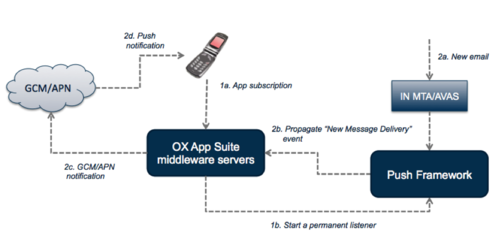Dovecot Push deprecated
This article describes how to configure the Dovecot Push feature, which allows e.g. pushing events to mobile clients/apps.
For a comprehensive guide to setup up Open-Xchange Middleware for mail push, please see here
The following picture should demonstrate how the overall communication flow between a mobile app, Open-Xchange Middleware, and the Dovecot Push plug-in takes place.

Prerequisites
- At least Dovecot v2.2.19
- Either METADATA (RFC 5464) support or enabling the Middleware's connector for the Dovecot DoveAdm REST interface
Enable the Middleware's
open-xchange-push-dovecotpackage. The package can be enabled in your chart'svalues.yaml:core-mw: packages: status: open-xchange-push-dovecot: enabledSet
com.openexchange.push.dovecot.enabledtotrueInstallation of the Dovecot
http-notifyplug-in
Enabling METADATA support
Dovecot Push plug-in requires METADATA support on Dovecot side, but it should only be enabled for OX IMAP sessions and not for any other IMAP clients directly. Enabling can be done with e.g. the remote directive remote 1.2.3.0/24 { imap_metadata = yes } and specifying the IP ranges of OX.
Dovecot supports the METADATA (RFC 5464), which allows per-mailbox, per-user data to be stored and accessed via IMAP commands.
To activate metadata storage, a dictionary needs to be configured in the Dovecot configuration using the mail_attribute_dict option.
To activate the IMAP METADATA commands, the imap_metadata and mail_attribute_dict options need to be activated.
Example:
# Store METADATA information within user's Maildir directory
mail_attribute_dict = file:%h/Maildir/dovecot-attributes
remote 1.2.3.0/24 {
protocol imap {
imap_metadata = yes
}
}
Configuring connector for the Dovecot DoveAdm REST interface
As alternative to the METADATA (RFC 5464) extension, the DoveAdm REST interface can be used to register listeners on Dovecot side.
For enabling the connector for the Dovecot DoveAdm REST interface, the following configuration options need to be set (for instance in file /opt/open-xchange/etc/doveadm.properties):
Enabling the connector
To prefer the REST interface set com.openexchange.push.dovecot.preferDoveadmForMetadata to true. Addtionally, com.openexchange.dovecot.doveadm.enabled is required to be set to true
Connection settings
Typically the DoveAdm REST end-point is accessible on port 8080 via API path /doveadm/v1.
com.openexchange.dovecot.doveadm.endpointsneeds to point to Dovecot's DoveAdm REST end-point; e.g.com.openexchange.dovecot.doveadm.endpoints=http://imap.example.com:8080/doveadm/v1. However, this setting accepts multiple commo-separated end-points, in which case end-poins are used in a round-robin fashion when an end-point becomes (temporarily) unavailable (and thus is black-listed).
Further connection settings
com.openexchange.dovecot.doveadm.endpoints.totalConnectionsspecifies the total number of connections held in connector's HTTP connection pool. Default is100.com.openexchange.dovecot.doveadm.endpoints.maxConnectionsPerRoutespecifies the number of connections per route held in HTTP connection pool; or less than/equal to0(zero) for auto-determining. Default is0.com.openexchange.dovecot.doveadm.endpoints.readTimeoutdefines connector's read timeout in milliseconds for HTTP requests issued against the Dovecot's DoveAdm REST end-point. Default is10000com.openexchange.dovecot.doveadm.endpoints. connectTimeoutdefines connector's connect timeout in milliseconds when establishing a HTTP connection to the Dovecot's DoveAdm REST end-point. Default is3000com.openexchange.dovecot.doveadm.endpoints.checkIntervalgives the time interval in milliseconds when to check if a previously black-listed end-point is re-available again. Default is60000
API secret
com.openexchange.dovecot.doveadm.apiSecret accepts the API's secret string, which is supposed to be transferred to the DoveAdm REST end-point through the Authorization HTTP header for authenticating the request:
POST /doveadm/v1
Authorization: X-Dovecot-API <base64-encoded-apiSecret>
Configuration of Dovecot "http-notify" plug-in
To use push notifications, both the "notify" and the "push_notification" plugins need to be activated. For LMTP delivery, this is required:
protocol lmtp {
mail_plugins = $mail_plugins notify push_notification
}
If you also want push notifications to work for LDA-based delivery, you would need additional configuration:
protocol lda {
mail_plugins = $mail_plugins notify push_notification
}
The HTTP end-point (URL + authentication information) to use is configured in the Dovecot configuration file. The appropriate configuration options will contain the HTTP URL denoting the end-point to connect to as well as the authentication information for Basic Authentication as configured by properties com.openexchange.rest.services.basic-auth.login and com.openexchange.rest.services.basic-auth.password. The URL to configure in Dovecot configuration follows this pattern.
<http|https> + "://" + <login> + ":" + <password> + "@" + <host> + ":" + <port> + "/preliminary/http-notify/v1/notify"
Please note that SSL endpoints are only supported from Dovecot >= 2.3.
Example:
plugin {
push_notification_driver = ox:url=http://login:pass@node1.domain.tld:8009/preliminary/http-notify/v1/notify
}
Furthermore, it is also possible to specify more than one HTTP end-point to connect to if a new message delivery occurs. Thus the configuration section mentioned above may be extended by additional push_notification_driver entries; e.g. push_notification_driver2, push_notification_driver3, etc.
Please note that the path "/preliminary/http-notify/v1/notify" denotes the internal REST API of the Open-Xchange Middleware, which must not be publicly accessible. If you have deployed OX App Suite with our stack chart, the endpoint should be accessible by default.
In case the "user=" sent by OX in the push_notification_driver URL data does not match the IMAP login of a user, Dovecot ignores it. This can be overridden by defining "user_from_metadata" in the push_notification_driver URL, e.g.
push_notification_driver = ox:url=http://example.com/ user_from_metadata
